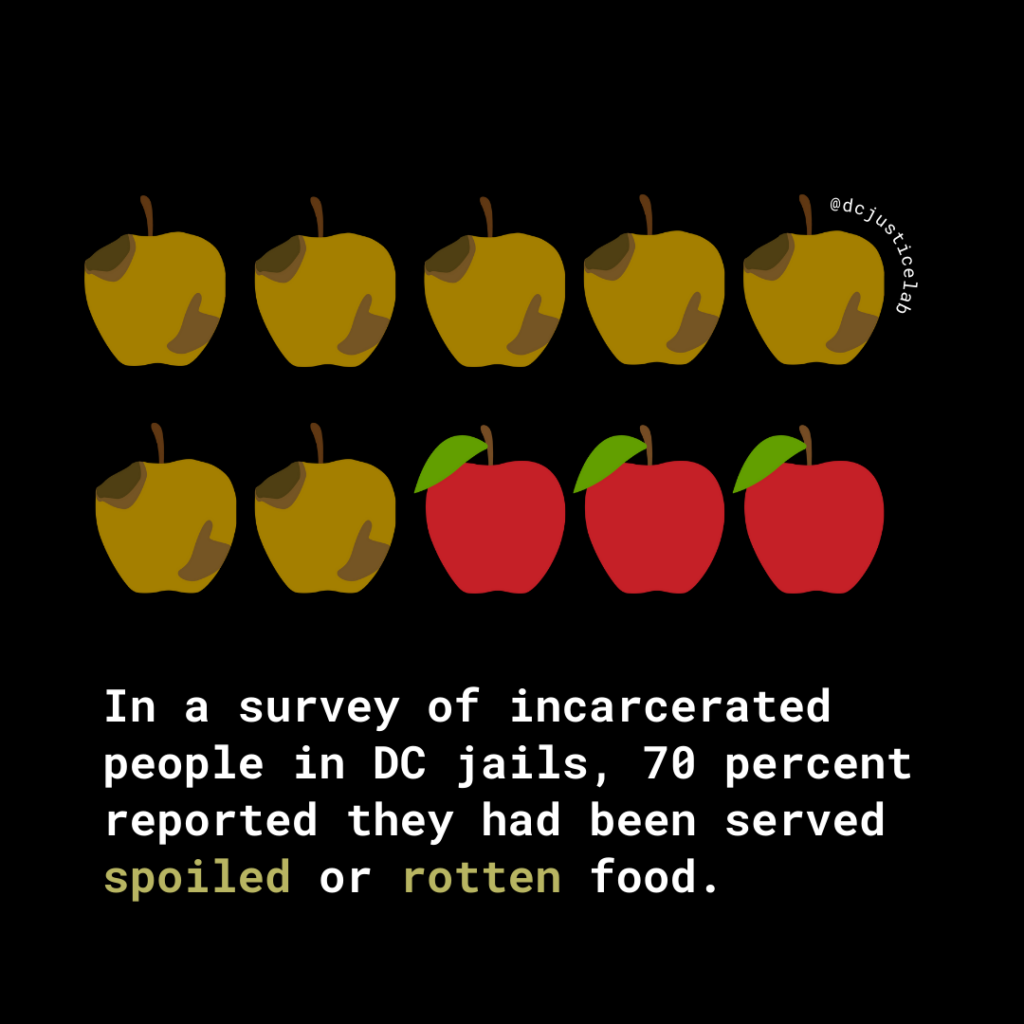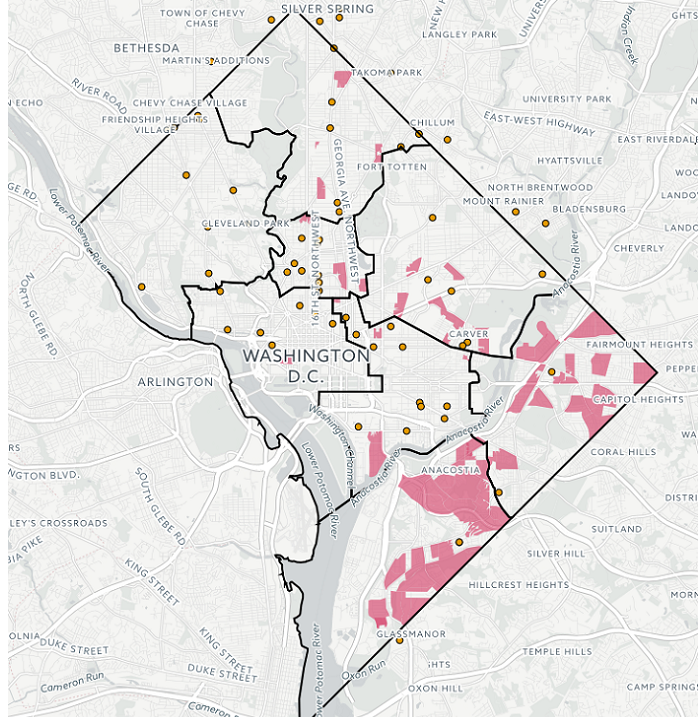food in the dc jails
Unhealthy food makes every sentence a life sentence.
- 3 Minute Read
Many investigations and public testimony have shown the food in the DC jails to be inedible, moldy, vermin-infested, stored at unsafe temperatures, and served in insufficient quantities. Seventy percent of people surveyed in DC jails said they had been served spoiled or rotten food, leading residents to skip meals and go hungry. For the 4,600 people who return to the community from the DC jails every year, the lack of access to nutritious food increases the likelihood that they will have a variety of health issues, making it harder to reintegrate into communities, and decreasing safety for everyone. Jails in Maine, California and Ohio have improved access to quality food. By passing the FRESH STARTS Act of 2023, the city can increase access for people in the jails to food that is healthy, fresh, and varied, as well as create a program within the jail to help individuals get jobs in culinary industries after release.

What you need to know
Lack of access to good, healthy food means DC’s jails and our communities are less safe.
Nutritional deficiencies lead to a decline in physical and mental health. Hunger and eating poor-quality foods can lead to brain fog, heightened depression, anxiety, anger, and impaired brain development. Bad food can also cause misinterpreting social cues or failure to regulate emotions or reactions. Additionally, trauma and substance use are linked to malnutrition and food insufficiency. This can increase the likelihood that anyone – in jail or not – may have volatile interactions. Healthy and nutritious meals, culinary programs in facilities, and gardens in prison are linked to boosts in self-esteem and reductions in violence.
Multiple agencies have documented the challenges of food in the DC jail.
The DC jails’ food conditions have been scrutinized since the 1970s through many investigations by the Office of the District of Columbia Auditor, the District of Columbia Corrections Information Council, the United States Marshals Service, and the Washington Lawyers’ Committee. These investigations have described the food in the jails as inedible, moldy, vermin-infested, served in unsanitary conditions, and nutritionally insufficient. In a 2023 survey conducted by DC Greens (with support from DC Justice Lab) of people incarcerated at DC jails, the vast majority reported experiencing unsafe food, lack of nutritious meals, and frequent hunger, with 70 percent reporting they had been served spoiled or rotten food. One resident in the DC jail surveyed said, “the food is unhealthy, inhumane, the worst food I’ve ever seen in a jail.” Aramark, the third-party company that manages the food contract for DC jails, has been repeatedly sued and fined in multiple states for providing rotten food and inadequate portions and sickening people in facilities across the country
Access to high-quality food in the jail and in the community is a racial justice issue.
The lack of access to healthy food for Black people in DC before, during, and after incarceration is cyclical in nature and connected to making our city less safe, less equal, and less healthy.
- Ninety-one percent of people in the DC jails are Black.
- Seventy five percent of food deserts are in Ward 7 and Ward 8, where nine out of ten of residents are also Black.
- Formerly incarcerated people are twice as likely to be food insecure as households without incarcerated family members.
- Households with incarcerated family members are 15 percent more likely to experience food insecurity.
- Black life expectancy for men is 15 years less than white people.
Community pressure forced some changes at DC correctional facilities, but more is needed.
Several years of organizing and awareness-raising led to some significant reforms for food at the DC jails under legislation passed by the Council in March 2024. For the first time, the Department of Corrections will be required to establish and follow nutrition standards, feed residents appropriate special diets, such as for religious or medical reasons, publish the results of certain inspections, and improve its workforce development training in culinary arts and hospitality for residents. These changes require funding through the DC budget process, which is still underway in the spring of 2024. A critical need continues for greater oversight of the Department of Corrections and to transform the food at DC jails.
WHERE TO LEARN MORE
The Vera Institute of Justice February 2024
The Grim Grub of Incarceration: Voices Unlocked – A Podcast of More than Our Crimes\ January 2024
DC Greens 2023
Don’t Mute My Health 2023
Elected Advisory Neighborhood Commissioner May 2023
Inquest May 2023
Formerly incarcerated person from the DC Jail 2023
Office of the DC Auditor February 2019
Washington Lawyers’ Committee June 2015
Worth Rises 2020
Interviews with people incarcerated in the DC jails about food and other conditions March 2019
Our Solutions
DC Should:
- Pass the FRESH STARTS Act of 2023
- End the contract with Aramark in FY 2024
- Use money in the current corrections budget to buy better and healthier food
- Contract a chef to oversee the food service program
- Develop a kitchen in the new jail that is designed to provide healthy food
- Transition the DC DOC food service program into a self-operated kitchen
special thanks
Impact Justice ★ DC Greens ★ Lea Howe ★ Kristy Throndson ★ Leslie Soble ★ Daniel Rosen ★ Leonard Bishop




